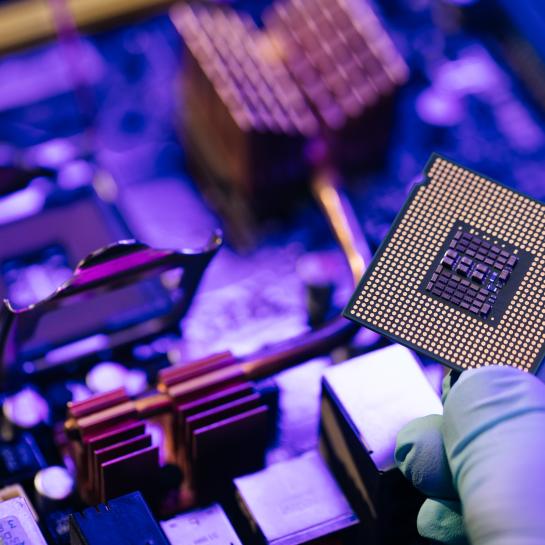
Acronym: CHIPDIPLO
Title: Chips Diplomacy Support Initiative
| Period | 18 months - 01.03.2025 to 31.08.2028 |
| Project budget | € 788,657.52 |
| VUB budget | € 169,950 |
| Contact | Prof. Antonio Calcara |
Each week, the ERIS team at VUB TechTransfer highlights a newly awarded EU-funded project involving VUB. This week, we’re spotlighting CHIPDIPLO, a project focused on Europe's chip diplomacy and semiconductor strategy. We had the opportunity to speak with Prof. Antonio Calcara about VUB’s contributions and the project's broader geopolitical impact.
Can you provide a brief overview of the CHIPDIPLO project and its primary objectives?
The main objective of the CHIDPLO project is to analyse European foreign policy in the field of semiconductors, which are essential for every digital product and whose access is crucial for Europe's competitiveness, security and industrial future. At a time when the security of supply of these components is no longer guaranteed, geopolitical risks related to the US- China rivalry and Russian ambitions in Europe need to be better integrated into public and private decision-making. The EU has an urgent need for chip diplomacy to better anticipate crises, adapt to the geopolitical environment and achieve the competitiveness, innovation and dependency reduction goals outlined in the “Draghi Report”. Our consortium has been selected by the Directorate-General for Communications Networks, Content and Technology (DG CONNECT) to enhance risk assessment and information sharing among EU semiconductor stakeholders, improve internal coordination and promote effective international outreach through a balanced external partnership. Given our role as a neutral third party, the CHIPDIPLO project will facilitate dialogue, conduct research and promote advocacy.
What role does VUB play in the CHIPDIPLO project, and what are some of its key contributions?
As part of the Chips Diplomacy Support Initiative, the VUB will play a key role in organising two closed-door workshops, one in Brussels and one in Eindhoven, on the geopolitical implications of competition for access to advanced semiconductors and a public event in Brussels in 2026. In addition, VUB researchers will conduct research on the debate between strategic autonomy and strategic indispensability in the European context, looking at both the supply and demand of advanced semiconductors. The role of the VUB will be strengthened by existing synergies with the Geopolitics and Technology programme, led by Prof. Antonio Calcara, which also looks at the geopolitics of semiconductors from a multidisciplinary analytical perspective. More information on the Geopolitics and Technology programme can be found here: https://csds.vub.be/program/geopolitics-and-technology/
What will be the broader societal impact of CHIPDIPLO?
The CHIPDIPLO project has three main impacts on society. First, through events and scientific research, it will raise awareness of the importance of semiconductors for every digital product. A wide range of industries, first and foremost the digital industry, depend on access to advanced semiconductors. Secondly, the project aims to provide European institutions and Member States with tools for better internal coordination to strengthen risk management and supply chain resilience in this strategic sector. Finally, the project will provide advice on how to manage Europe's external relations with key partners, including the United States, Japan, South Korea, Singapore and Taiwan, as well as emerging players such as India and ASEAN countries.
